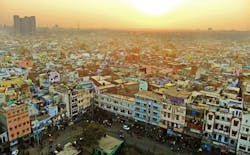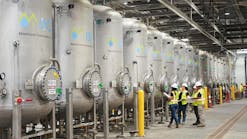| Khajuraho, India, Girls pumping from water from communal pump |
Enthusiasm for IUWM
During India Water Week in January 2015, GWP -- in collaboration with GWP India and WAPCOS Limited -- held a one day training on Integrated Urban Water Management (IUWM). The objective was to introduce IUWM as an approach, in particular for India. The workshop saw high enthusiasm from the representatives of government, different institutions and partner organizations (ICLEI, Taru Research, Development Alternatives, Centre for Science and Environment (CSE)).
During the training an interest was expressed by Dr. Amarjith Singh (Secretary to the Ministry of Water Resources, River Development and Ganga Rejuvenation (MoWR)) to develop a programme on IUWM for India that includes awareness raising and capacity building activities.
Dr. Singh said: "Considering India's vast challenges and needs, a new framework and approach is required for efficient water management and IUWM provides this framework."
Potential solution for India
So why is IUWM right for India? The IUWM approach is a paradigm shift for urban water management. It is not a prescriptive model but a process that invites existing cities and emerging ones to adjust their current planning and management practices, given their own priorities, in a hydrological, environmental and socio-economic context. It is based on the following key concepts:
• Participation of key stakeholders coming from the public, private and social sectors representing different socio-economic activities that have an interest in water in urban areas. There can be many stakeholders involved but an agreement needs to be reached with the representatives of local government who remain the main convener. Not all have the same role and responsibility, but all need to be aware and contribute.
The participation of stakeholders is needed in order to: break ‘silos' between different sectors and activities; reach a common understanding and vision of challenges and activities; understand and balance interests and needs of different stakeholders; strengthen cooperation, sustainability and ownership; and induce behavior change and realistic demand management.
• Urban water security through a holistic approach implies managing water resources and its waste in a new integrated way, with a focus on: considering the whole urban water cycle as one system within the watershed; aiming for water security through diversity and optimum use of all potential sources of water and matching water quality with purpose of use; aiming for a better utilisation of natural systems for water and wastewater treatment; considering storm water/rainwater catchment systems as a potential source; better managing use of water, effluents and water demand and hygiene behavior; strengthening leakage management and maintenance; strengthening resilience of urban water systems that are facing drought or floods.
• Wastewater is a resource that can be used productively. Grey water can be reused for irrigation, urban agriculture and industrial processes, treated or untreated depending on the purpose of its use and its legislation; nutrients in wastewater (grey and black) can be used for energy production and fertiliser production.
• Optimum infrastructure design implies the following key points: technology selection for water supply, wastewater treatment and sanitation is based on a multi-criteria decision support system to analyse a wide range of indicators; such indicators include water quality, economic condition of households, size of population, access to advanced technologies and skilled manpower, availability of land, institutional set up and more; and this includes green infrastructure and low cost and energy efficient options, natural systems and innovative technologies
• Effective water governance with an IUWM perspective encompasses many aspects with the main following key elements: adopting a new mind set, a holistic and cross sectoral approach linking urban water management with overall urban planning; adjusting some of the policy and legislation concerning the use of water and reuse of waste water; analysing aspects of centralised and decentralised management; assessing the economic and financial impact of adopting an IUWM approach; building the capacity of technical and managerial staff; and sharing information with the public and users.
Looking forward
The urban water management situation in India is dire and there is a lot of scope and opportunity for GWP and its local partners to carry out activities that can make a significant difference. The good news is that there is strong political will in the country to improve water management. Already the government has initiated a few programmes, like 100 smart cities, the National Mission to Clean Ganga and the Total Sanitation Programme.
François Brikké is senior network officer, Global Water Partnership. He has 25 years experience in the water sector, including at UNICEF, the World Bank and IRC.
More Water & WasteWater International Current Issue Articles
More Water & WasteWater International Archives Issue Articles



